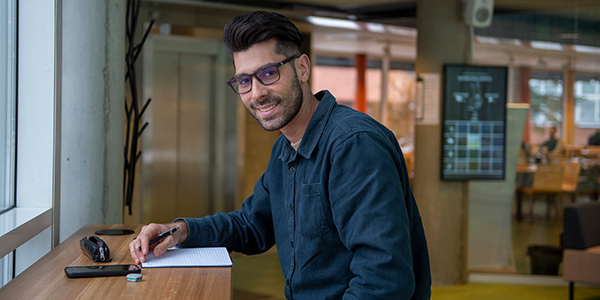Esteban Montero
When Esteban Montero was looking for Master’s programmes in Forestry, the key aim was to find a programme that was highly international. He got what he wished for and more, as the whole idea of the Erasmus Mundus Joint Master Degree Programme (EMJMD) in European Forestry is about gaining experience from the network of 6 renowned universities – and from fellow students in a multicultural student group.
Esteban is a Brazilian native with half Brazilian, half Chilean heritage, and the emotional tie for nature and forests has been there throughout his life.
–I’ve been surrounded by nature all my life, and and forests enticed me already as a kid. We often visited my Mom’s home country Chile and the Andes, and there I really fell in love with the mountains – and for winter sports like skiing, that I can now continue in Finland.
That desire to spend time in nature led Esteban to study Forest Engineering. During his studies, he participated in an exchange programme in the US, volunteering as a wilderness ranger in a National Forest. After returning home, he continued with a job in a nature conservation NGO and a later took a post-graduate course in eco-tourism in Barcelona.
–Those experiences really crystallised how nature conservation, tourism and the economy are intertwined – that you need to find a balance between these. The paradigm shift is to move away from the dichotomy between nature conservation and economic development. I wanted to broaden this understanding and started to search for a suitable Master’s programme.
CONTINUOUS FLOW OF STUDIES
Esteban first heard about the Erasmus Mundus MDP in European Forestry from his friends.
–It is a well-known programme, where the knowledge of 6 partnering universities and multiple other partnering institutes come together. You cannot imagine a more international setting to learn about forestry in Europe and in global scale.
The programme also features a generous scholarship scheme, which enabled Esteban to start a new chapter in life: studying in Finland. He started studies in August, 2019 – and right away the group took a introductory course on European Forest Trends, in order to contextualize the importance of forestry in the Finnish and European reality. The group is very excited for month-long field excursion, taking place in May, 2020, to visit all the other partnering universities: in Austria, France, Germany, Spain and Romania. Studies in Finland will last until April, then there is an applied period until the students get to go to the chosen location where they will study in the second year.
–Most likely I will opt for Vienna, because of the location in the mountain region, as well as the program in Forest Policy and Governance, as my research has been focused on that.
As a positive person, Esteban didn’t want to pressure himself with too many expectation on the studies beforehand – but now he feels that the quality of studies in Finland turned out to be above all possible expectations.
–I like the way the courses are condensed to 3–4 weeks. You study hard for that period of time, build knowledge rather quickly, and then continue with other courses – it’s kind of a continuous flow. It is easy to choose courses according to certain themes: whether you want to focus on e.g. economics, forest policy and governance, forest conservation, industry and forest management. I really like the structure that enables you to focus fully on studies, not fixing timetables.
SOCIAL CAPITAL & FUTURE AMBITIONS
Before coming to Joensuu, a mid-sized city (by Finnish standards) in the densely forested part of Finland, Esteban had already study experience from Brazil, Germany, and the US.
–Still, this is the most international environment I’ve ever lived in. In our group there are 21 students with 13 different nationalities. It is a very diverse mix of cultures, religious backgrounds, ages and forestry knowledge from different parts of the globe. There are students from China, Bosnia and Herzegovina, Latvia, Romania, Spain, Nepal, Bangladesh, Paraguay, Costa Rica, England, The Philippines, Vietnam, and myself along four other Brazilians.
After the Master’s degree, Esteban is aiming for PhD – but on the other hand, there seems to be interesting job opportunities waiting as well.
–I would like to focus on the multiple-use of forests. Promoting non-wood forest products and ecosystem services, meaning e.g. recreational use, human-health, wildlife watching, mushroom picking, berry picking and such is something I would like to work on.
In Finland, Esteban has been experimenting recreational forest use first-hand, as he’s done some hiking, running, berry and mushroom picking – and of course, enjoyed the Finnish sauna by the lake with his fellow students.
–We have really become a close-knit student group, in a short time. Many of us live nearby each other, so we spend time together cooking or just hanging out. It really feels like a family.
These long-lasting friendships and exchange of knowledge is something that Esteban really cherishes.
–Knowledge is important, of course, but in the end, no matter where you go, you work with people. I really value the social capital that we are accumulating each day in this programme.
